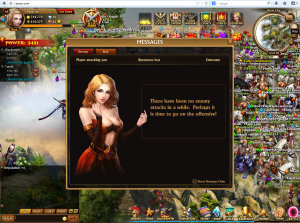I’ve been playing cow clicker games on my ipad lately and have seen the banner ad blitz from several similar F2P games on the Web: Evony, Tynon, whatever that one is that bills itself as exclusively for male gamers.
They all strike me as ochre-jelly slimy. But somebody must think there’s money in them. So I investigated Tynon.
There’s plenty of T&A, but it’s not very… sexy. I can see the lens that allows me to see the female characters as sexy, but the game doesn’t even really work all that hard to objectify. And the figures are tiny most of the time, so you can’t even get all that excited over tiny sprites with what would be proportionally big boobs. Most of the NPCs are mammarily gifted females, but they’re static images. They’re just half-naked drawings telling you to kill ten rats. The sex is almost purely marketing. That’s objectification, but it isn’t porn.

I never learned how to go on the offensive, but this Chinese-revolution-faced siren would try to lure me into it occasionally.
I’ve been watching it for about 20 minutes, and it seems to be less related to an rpg and more closely related to combat guessfests like My Brute.
I let the game name me “Madisyn”, one of several stripper-esque choices. The general populace had the usual doggerel of fantasy-ruiner names, such as “Monkeybutt” or “TigOlBitties”. I could have made a dude avatar, but I wanted to get the full experience.
“Auto-Navigation” walks you through what we’ll call “the story” on technical counts. This means it does nearly everything for you. It finds the next quest giver, walks you over there, clicks on him/her, and gives you money for showing up.
In fact, it’s playing itself while I’m writing this. I think I’m fighting zombies right now. Ultimately, this is the best choice because 1) you do a lot of boring things repetitively to grow (without money), and 2) the UI is cluttered like a 5-year-old’s room. You don’t have to mess with that when the game plays itself.
As I spent more time with Tynon, I began to see how deep it runs. It has dizzying complexity in equipment, henchmen, and skills, all of which pour into a central stat called “Power”. You want Power to go up so you can win more fights. Not all the math behind Power is transparent, so if you want to get at Tynon, you have to join the community and research.
What I would think of as the game environment—theme, graphics, my avatar, etc—is revealed to be entirely window dressing. Accordingly, they haven’t dumped just a whole ton of resources into that.
The real “game” is metagame. It involves management of Power-gaining resources, guild management, and a weirdly hands-off PvP, where you don’t control the fight — you just line up your guys beforehand and pick your opponents from a small pool. Protip: Try to pick the ones with lower Power.
The game is dog-simple to start and play. If that appeals to you, it’s got quicksand-like capacity to keep you around with numerous clever little F2P touches: rewards based on clicking every 30 minutes, negative reinforcement based around checking in every 24 hours, an announcement of the dollar value of the “gifts” the game gives you so you understand what stuff costs, a crawl that tells you when other players get lucky.

The box on the lower left gives you server chatter, but when something big happens, everyone sees it in a crawl across the screen.
There’s a business model underneath all of this that doesn’t need quality or even, apparently, a game to lure in money. I can’t tell how much of this bad design/good business is intentional, but I’m thinking, most of it.
I came into Tynon wanting to revile it and left with a begrudging respect. Not for the barely extant game, but for the sharp gamification from uCool, Inc. In addition to Tynon, uCool operates two different versions of Evony, and a Facebook game called Sunnytown, and yet has no customer-facing website of their own. If you work for uCool or know someone who does, get in touch. I’d like to see how this watch works.




